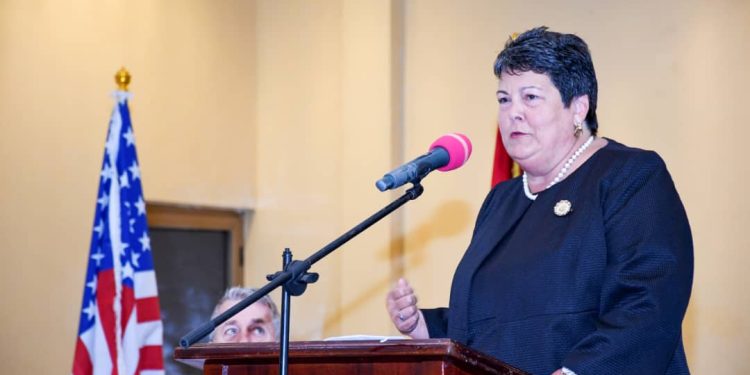adverts
The United States Ambassador to Ghana, Virginia Evelyn Palmer, has moved to reassure Ghanaians about the continued strength of the U.S.-Ghana trade relationship, despite concerns over a newly announced 10% tariff on Ghanaian exports.
The tariff forms part of a broader suite of protectionist measures recently introduced by U.S. President Donald Trump, aimed at safeguarding American industries from what he described as “years of unfair economic exploitation.” The measures include a steep 34% levy on Chinese imports and a 20% tax on goods from the European Union, triggering global concerns about escalating trade wars.
In a statement from the White House Rose Garden, President Trump asserted that the tariffs were necessary to protect domestic manufacturing and preserve American jobs. He described the move as a “national economic emergency”, adding, “We can no longer sit back and allow other countries to take advantage of American businesses and workers.”
adverts
While the sweeping tariffs have drawn backlash from global leaders, Trump’s administration maintains that these measures are critical for restoring America’s economic strength and reducing trade imbalances.
In response to concerns that the 10% tariff could hurt Ghana’s export sector, Ambassador Palmer emphasised the resilience of the U.S.-Ghana partnership, which she described as “deep and enduring”.
Speaking at a press briefing in Accra, Palmer stressed the longstanding relationship between the two countries, highlighting more than $3 billion in bilateral trade and investment. “The life-saving programmes are all to be continued,” she assured. “The US and Ghana have a very warm, close relationship, and that is founded on four pillars: historical and cultural ties, trade and investment, security cooperation, and development assistance.”
Palmer dismissed fears of a major economic fallout, underscoring that Ghana’s key exports—gold and gas—remain vital to the global market and are less likely to be significantly affected.
She highlighted the importance of goods and services exchanged between the two nations, including Ghana’s gold and gas exports and American automobiles and pharmaceuticals.
“No matter the changes in language and no matter the change in focus, Ghana is really an important part of the United States, and we will continue to be so,” Palmer said, emphasising that the partnership remains robust.
Despite Palmer’s reassurances, Ghanaian exporters are uneasy about the potential effects of the new tariff. The Ghana National Chamber of Commerce and Industry (GNCCI) expressed concerns over the tariff’s potential to undermine the competitiveness of Ghanaian goods in the U.S. market.
“It is critical for the government to engage U.S. authorities to seek clarifications and possibly negotiate better terms,” said GNCCI President Clement Osei-Amoako.
Some business leaders argue that the tariff could reduce demand for Ghanaian products, impacting local industries and employment.
As the dust settles, the tariff serves as a test for the strength of U.S.-Ghana relations, with analysts questioning the long-term impact on trade and investment.
However, Palmer’s assurances reflect optimism that the longstanding partnership, rooted in shared values and mutual respect, will prevail even amidst evolving global trade dynamics.
Ghanaian officials are expected to continue diplomatic engagements with the U.S. government to seek clarity on the new tariff and its implications for trade. As Ghana adapts to the global trade landscape, the resilience of the U.S.-Ghana relationship may ultimately determine how well it weathers this economic storm.
Click the link Puretvonline.com | WhatsApp Channel to join the whatsapp channel
GOT A STORY?
Contact/WhatsApp: +233243201960 or Email: manuelnkansah33@gmail.com


